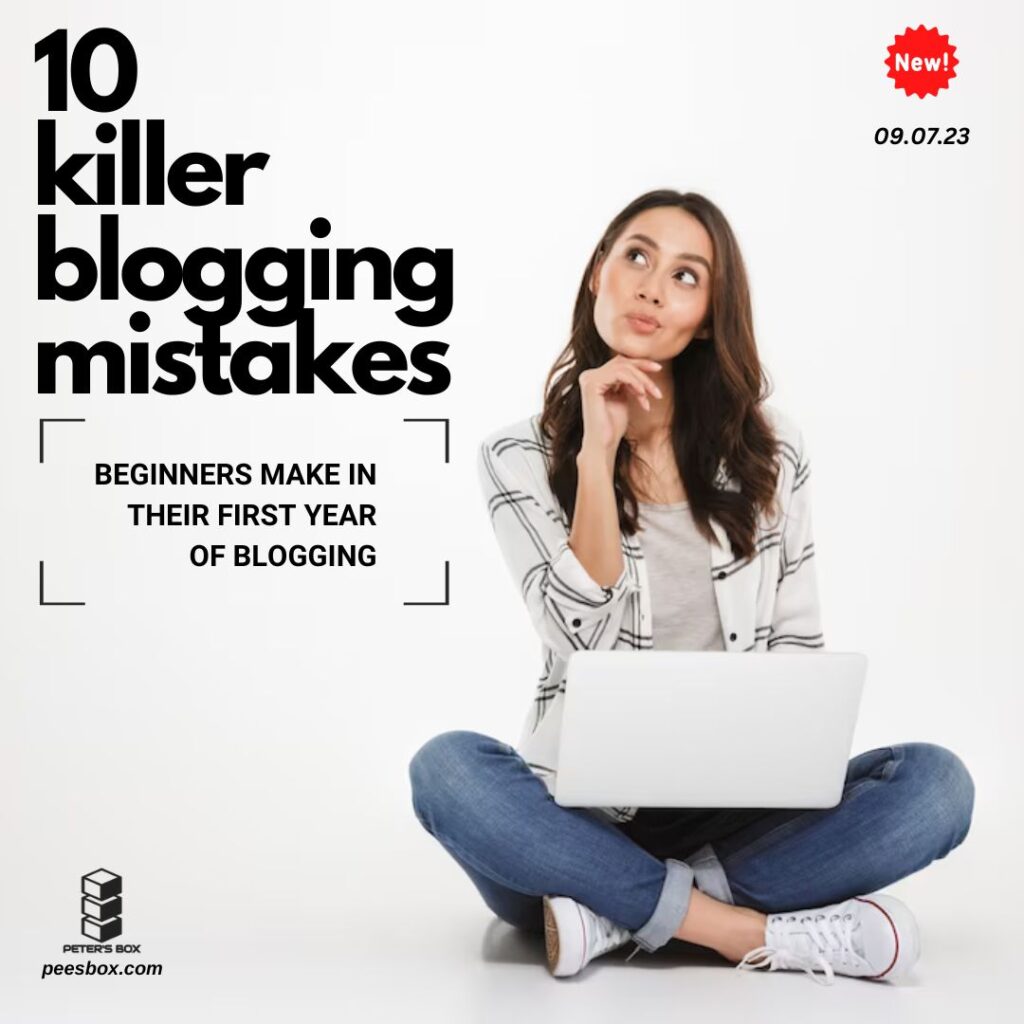Last updated on July 26th, 2023 at 11:15 am
Have you ever been trapped by those complex philosophical puzzles that demand you pick only one alternative out of the many that may exist? In my previous post, ‘Trolley Problems: Who Will You Save and Why?‘ I discuss the objective of these puzzles. Click here to read it.
My first post on Peter’s Box was published exactly one year ago today! Happy Anniversary! I’ll be sharing some mistakes I made this year and how they could negatively impact your blogging journey. Read on!
Learn from my blogging mistakes
Don’t make these ten blogging mistakes in your first year of blogging! There’s a good probability that if you’re reading this, you either have a blog or would like to start one. If you are yet to start one, here’s some advice: there is no such thing as an ideal moment to start. Begin right away after reading this post! Today marks my one-year blogging anniversary. On this date last year, I published my first blog post on Peter’s Box. I have published 30 posts since then. With each post I wrote, I learned something new and improved my blogging skills. I hope you do not repeat these mistakes I made in my first year of blogging.

10 killer blogging mistakes
- Brandless blogging without a defined niche
- Blogging when you feel like it
- Learning blogging tips and not applying them
- Not reading your posts
- Blogging for traffic and not people
- Chasing blogging income
- Blogging solo without a blogging community
- Focusing on SEO and ignoring content marketing
- Blogging hard and not smart
- Self-promotion without Call to Action
1. Brandless blogging without a defined niche
I started my blog, blogging. Isn’t that what a blog is meant for? To publish and share posts. That was my first mistake as a blogger, and many other new bloggers will most certainly commit the same. Unfortunately, this mentality about regularly publishing posts does not do justice to what blogging is all about. You might as well visit your Facebook wall and share what’s on your mind. Twitter is also not far away. I am not trying to sound cheeky. There’s no need to pay for a host and a domain name to set up a website if your sole purpose is to publish and share posts. That’s brandless blogging without a defined niche.
Blogging is the practise of addressing a reader’s problem by disseminating the knowledge required to address the issue through the publication of posts. Even if it’s only to keep them entertained, your blog must be useful to visitors. Before you publish your first post, you must establish the purpose of your blog. You face the risk of writing on any topic that comes your way. This can end up being self-defeating in the long run. Your readers will be inundated with an excessive amount of useless information.

Identifying the possible problems is what determines a blogging niche. A unique topic that appeals to a particular target audience is referred to as a niche. There are different kinds of blogs. Food blogs, entertainment blogs, science blogs, music blogs, travel blogs, and so on. You see what I mean? They are niche-specific. Don’t be tempted to classify your blog as a personal blog if it isn’t. Personal blogs, like other blogs, also need branding—something that distinguishes you from the competition. Like a logo for your blog. Or a tagline.
If you were with me when I first started, you’d see that I didn’t have a niche. Peter’s Box was my personal blog; therefore, I was blogging away on it. Blogging on everything and anything. I clarified my blogging niche after learning about niching. To understand what I mean, view my homepage. Having a branded blog with a defined niche has several advantages.
- You’ll attract loyal readers who are interested in your niche.
- You firmly establish your authority as the go-to blog among personal blogs.
- Because your readers are already familiar with your niche, there is already a level of trust established even before you start selling goods and services. An entertainment blog is not where I would choose to purchase a kitchen gadget. I’ll be much more comfortable purchasing it from a food blog.
- Over time, Google and other search engines will learn to rank your website based on your niche.

Ryan Biddulph of Blogging From Paradise is an example of a blogger with a branded blog with a clearly defined niche. Another is Silent Beads, which has positioned itself as a relationship blog. Eli of Study Eagle runs a branded blog in the I.T. niche. What is your blogging niche? Leave it in the comments section.
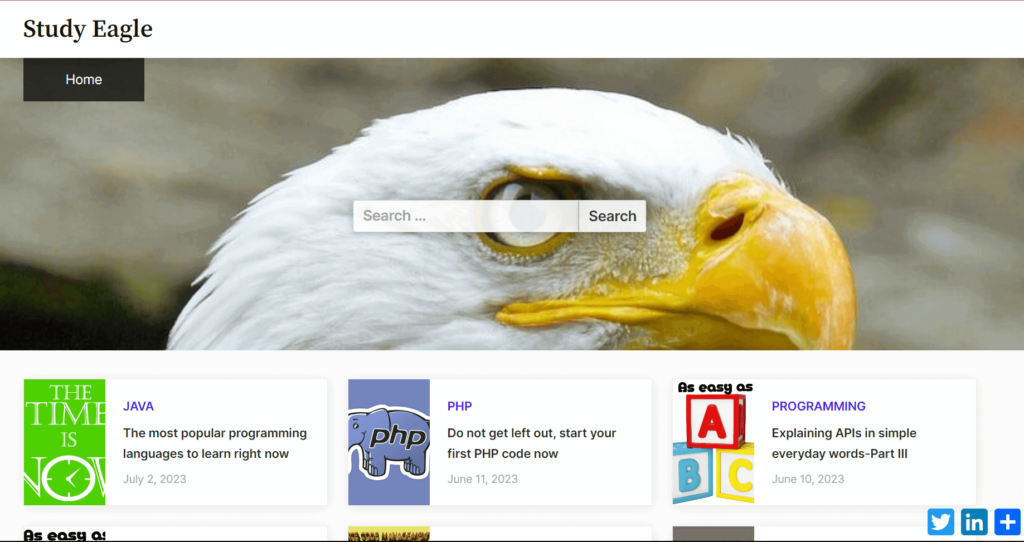
2. Blogging when you feel like it
The first mistake is typically what leads to blogging whenever you feel like it. Lack of a niche forces you to blog about everything at any time. Isn’t this a good thing? Yes, you will receive traffic at first, but your readership will eventually dwindle. Even when you have a defined niche, don’t be tempted to blog when you feel like it. Create a posting schedule and stick to it. How often should you blog? It is determined by a lot of things, including your own schedule and the kind of post. There is a general principle you may stick to, to make sure you blog regularly rather than just when the mood strikes. It is straightforward, but rigorous adherence is required. The rule is simple: Write every day.
Writing every day does not always entail finishing an entire post every day. It simply means making it a habit to write anything, whether it be an idea, a post title, a related story, an excellent example, etc. This gives you something to fall back on when you run out of ideas. Weekends are the days that I personally set aside for intensive writing. Throughout the week, I jot down ideas.

On my post, Blogging Nuggets from a Pro, Lisa Sicard of Inspire To Thrive left a comment. She gave a piece of advice she had picked up from Ryan Biddulph. Ryan recommends that you write at least 500 words every day. As a result, your site will be more active, and you will remain relevant in the blogging industry. Do you wish to join inactive websites? According to Forbes Advisor, just 18% of the world’s 1.13 billion websites are active, implying that around 926,600,000 are dormant. The bottom line is to avoid blogging only because you feel like it.
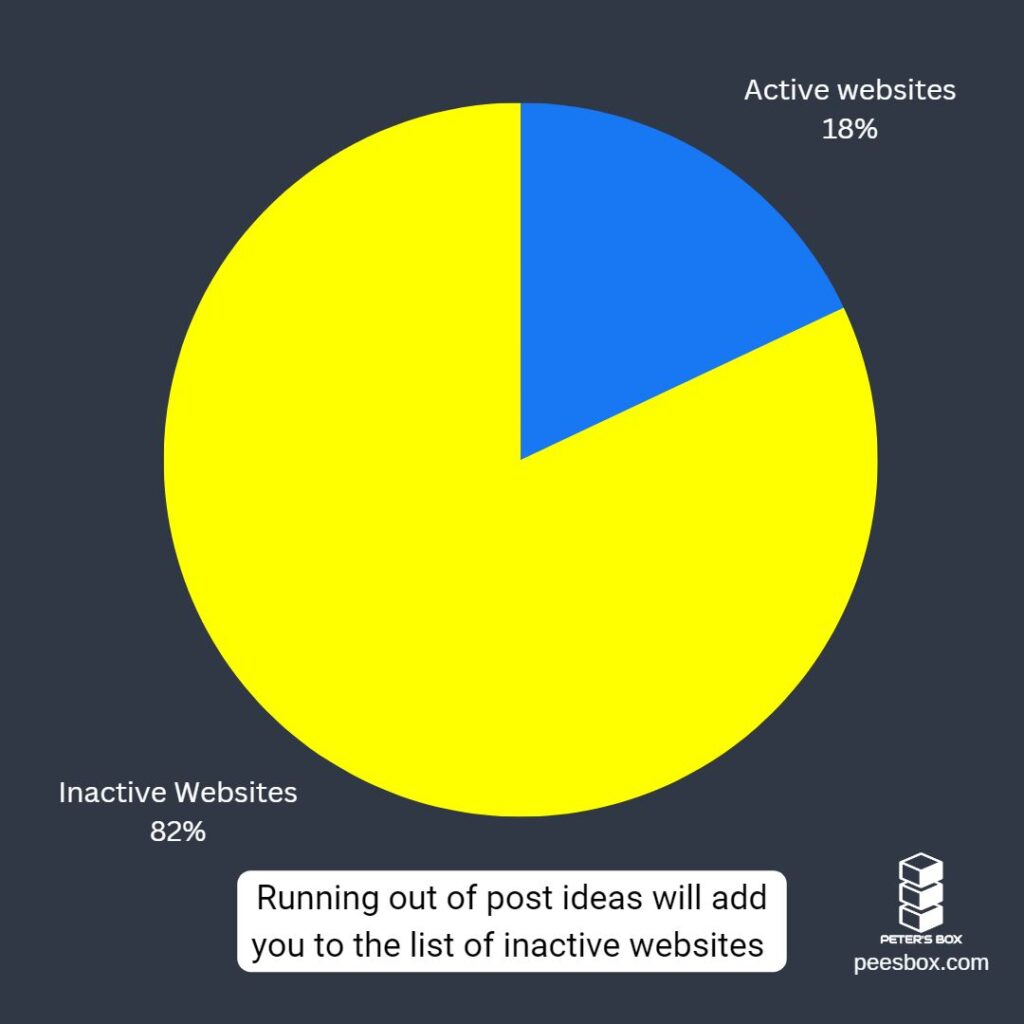
3. Learning blogging tips and not applying them
Learning blogging tips and not applying them will come back and bite you. The majority of blogging tips you’ll see are based on a variety of tried-and-tested techniques in marketing, web design, user experience, and human psychology that promote holistic growth rather than partial growth. If all advice were the same, then applying it would be simple. One type of advice may direct you to focus on SEO (search engine optimisation), while another may direct you to email marketing. There is a stronger tendency to put off applying a tip, the more sophisticated it is.
The goal of blogging advice is to be applied, not just read. Read and apply. That is what gets results. One important reason you should implement a tip right away, even if it’s very technical, is that it influences the quality of your blog and your readership reach. Email marketing is a good example. I regret not following this advice when I initially read it. Email marketing has proven to be the most successful means of securing visitors and closing deals. The setup for email marketing is technical. If you are new to WordPress, you will need to follow the setup steps. If all resources are accessible, proceed to implement the instructions after reading them. The next piece of advice you encounter might require a new set of technical instructions. At the end of the day, you will have wasted valuable time if you merely read the instructions without following them.

4. Not reading your posts
This mistake will cost you two things. First, you risk losing readers. Second, you will be guilty of spreading false information. To make sure that your posts are properly formatted and free of grammatical errors, incomplete phrases, and missing or misaligned visual aids, you should proofread them before publishing. No reader wishes to taint their command of any language. Instead, they want to expand their knowledge and learn new things. You should read your posts both before and after you publish them. Before, you will discover at least one mistake in your post that you may fix before clicking the “Publish” button.
After, because over time, certain evolving timelines have to be updated. Consider a post you wrote two years ago describing the features of a mobile application. New features have been introduced during the last two years, while some older ones have been removed. You want the content to be current and relevant to the reader. When you make a habit of reviewing your own posts, you guarantee that incorrect information gets rectified. You should also keep an eye out for statistics. You want to continue being as exact as you can. Readers won’t find it appealing if your website has outdated information.

5. Blogging for traffic and not people
I believe the biggest mistake is this one. The obsession with increasing traffic is particularly common among new bloggers. It is a direct consequence of the mistake that follows. Make sure your content is focused on people if you want to boost blog traffic. When a blogger employs cunning and deceptive techniques to click-bait readers, they are blogging for traffic. Avoid doing that. Don’t! Have you ever seen a post title that piqued your interest, only to be disappointed by the content? It was a waste of your time. You are extremely unlikely to read any posts from that blog site because of the high opportunity cost.
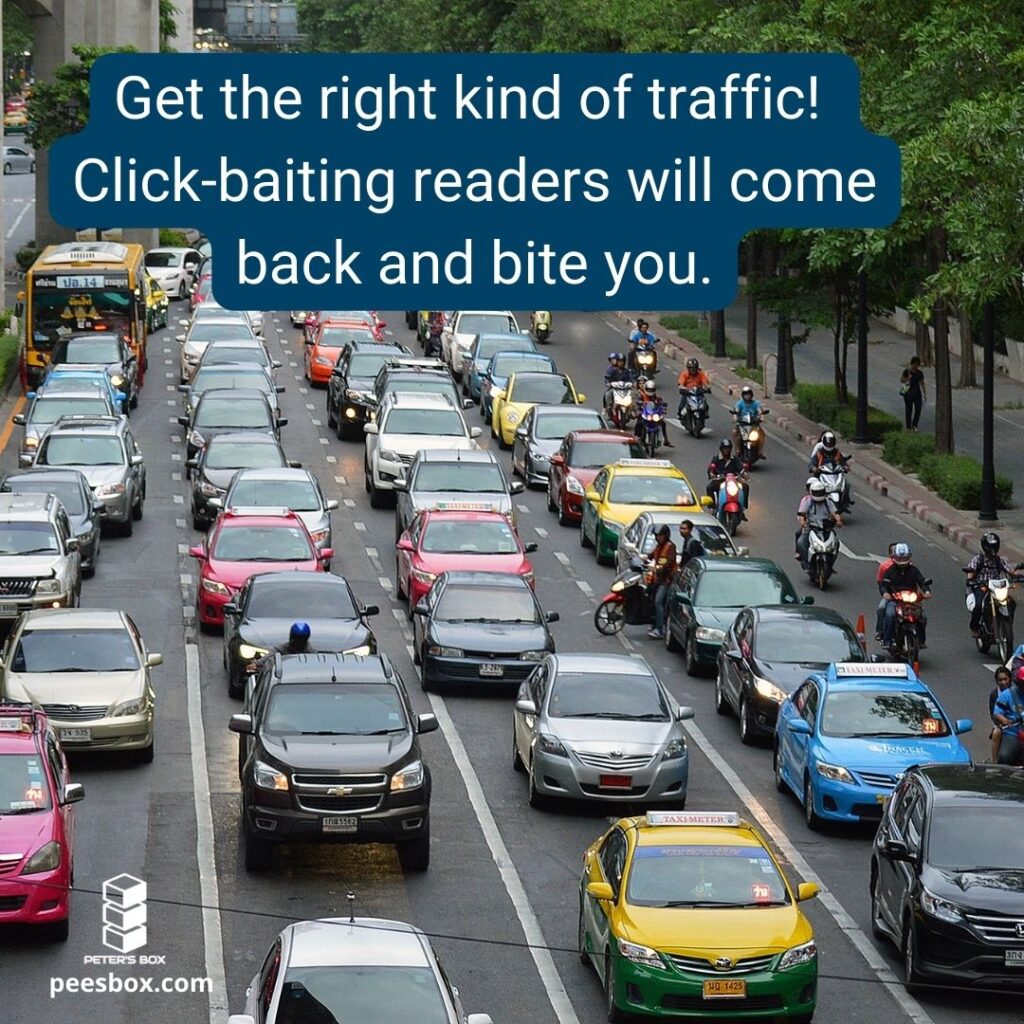
When you blog for traffic, you concentrate on numbers rather than people. Traffic is excellent, but only when it’s the right type of traffic. Your posts start to resemble content created for search engines rather than readers. You might have a perfect SEO score, but it would be meaningless if your content failed to address people’s concerns. One such example is disregarding keyword research. It is quite tempting to blog about what you have in mind. You’ll believe that what you have to say is more significant and that your audience should pay attention. Wrong! Wrong! I made that error much too frequently. When you use a search engine like Google to find information, you put specific phrases into the search box. These words are known as keywords. Fortunately, there are several online tools available that may assist you in monitoring the terms being captured by search engines. It provides you with a thorough report on the keyword’s behaviour, the number of times it has been used, and other websites that have also used it. Keywords are the people’s language. Don’t be a smartass! Use the keywords that your readers use.
I’ve got proof for you. I almost made that error when I published this blog post. This is not the original title I wrote for this post. I decided to submit my original titles for review by other copywriters since I now understand the value of headlines thanks to the content marketing course I took on Coursera. I shared the draft titles with the Science of Copywriting: Copy Critique Board Facebook Group. That’s when it dawned on me that the titles weren’t made for other people but rather for me. Here’s the conversation that transpired:
Hello everyone, I will be celebrating my one-year anniversary as a blogger this 9th July. As part of my anniversary celebration, I want to share some important blogging lessons with my readers and fellow bloggers. Understanding the importance of having a strong and effective headline as a content marketer, I want you to choose the strongest headline from the list below that would communicate the purpose of the post I will be publishing on 9th July. Feel free to revise any as well.
- One year of mistakes and rewards in blogging
- Blogging lessons after one year of blogging
- One year of blogging – the lessons and the rewards
- One year of blogging – 10 lessons and 10 rewards
- Mistakes and rewards in my one year of blogging
- Surviving one year of blogging – the lessons and the rewards
Quentin Pain responded as follows:
The biggest problem with all these headlines is they’re all about you Peter. The second biggest problem is that they’re about the past (and most people are only interested in the future when it comes to WIIFM). Think promises, benefits, and hope, and you will come up with a headline that really sells your value.
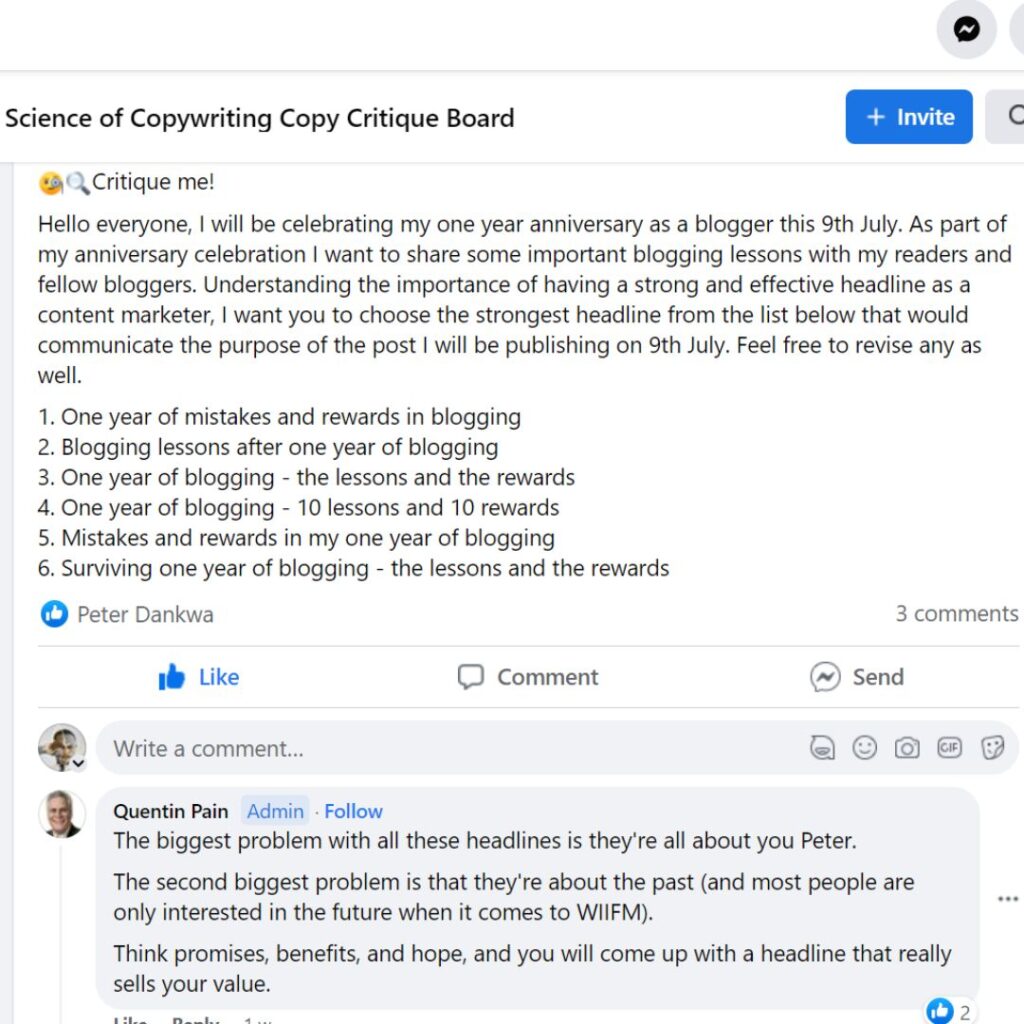
6. Chasing blogging income
Except for your site being a dedicated shopping site, I’m not sure why you believe you can earn large sums of money within weeks or months of blogging. It’s not that it’s impossible; it is if you blog correctly. However, it’s an unadmitted delusion spread among the beginner world of blogging that you will cash out big time. As a result, you spend most of your time chasing income rather than improving your blog. Here are a few indicators that a blogger is pursuing income:
- More than half of your time is spent researching Google Adsense and other advertising tools.
- You beg readers to visit your website and remind them that doing so enables you to monetize your blog.
- When you are not earning any money, you become frustrated.

Your income is proportional to the value you deliver to your readers. Spend more time adding value, and the money will come. There are several ways to monetize a blog. Here are a few popular approaches to consider:
- Advertising: One common way to monetize your site is by displaying adverts. Advertising networks such as Google AdSense, Media.net, Adsterra, and AdThrive can be used to insert contextual or banner advertising on your website. You may also sell advertising space to advertisers directly.
- Affiliate marketing: Promote goods or services that are associated with the subject matter of your blog, and you’ll be paid a fee for each sale or lead that results from your recommendation. Join affiliate networks like ShareASale, Commission Junction, or Amazon Associates to find related products to advertise.
- Sponsored posts and reviews: Collaborate with brands or businesses in your niche to publish sponsored content or reviews. They will compensate you for promoting their products, services, or content on your site. Keep things transparent and tell your audience when you’re using sponsored material.
- Digital products: Create and sell digital items related to the content of your blog, such as e-books, online courses, templates, or stock photos. Use platforms like Gumroad or Teachable to host and sell your digital items.
- Physical products: If your blog focuses on a specific niche, consider selling physical products related to that niche. Your target audience may be interested in purchasing merchandise, personalised products, or niche-specific stuff.
- Membership or subscription: In exchange for a monthly or yearly membership charge, provide your audience with premium information, unique tools, or an exclusive community. Membership programmes may be set up using platforms such as Patreon or WordPress plugins such as MemberPress.
- Sponsored social media posts: You may work with businesses to generate sponsored posts or social media campaigns if you have a strong social media presence. In exchange for remuneration, you may share their content, promote their goods, or give shoutouts.
- Consulting or coaching: Offer coaching or consultation sessions to your readers if you are an authority in the subject matter of your blog. You can charge a fee for your time and knowledge if you provide one-on-one sessions, group coaching, or courses.
- Events and webinars: Organise and host events, conferences, seminars, or webinars around the theme of your blog. You can charge a registration fee or seek sponsorship from relevant companies.
- Donations or crowdfunding: If your audience considers your work valuable, you may solicit voluntary donations or launch a crowdfunding campaign on platforms such as Patreon, Ko-fi, or GoFundMe.
Remember to use monetization options that complement your blog’s content and appeal to your readership. You may try out various techniques and combinations to see what works best for you. Many new bloggers are unaware that there are several other options to monetise their websites than Google Adsense. Now you know!
7. Blogging solo without a blogging community
No man is an island. Duh! Our influences converge. Surrounding yourself with other bloggers, especially professional bloggers, is the most efficient approach to advance your blogging career. Let me say it again. Surrounding yourself with other bloggers, especially professional bloggers, is the most efficient approach to advance your blogging career. The majority of your early blogging accomplishments will be the result of trial and error. That is common. That is something that every blogger goes through. It is, in fact, vital for your development. However, there is no need to reinvent the wheel. Why spend two weeks trying to figure out how to solve an issue when the solution is already available elsewhere in the blogging community? The blogging community is built on three pillars: support forums, blog guide sites, and course plugs.
Support forums: They consist of all social media communities that offer blogging peer assistance. You get to learn from the experienced and the inexperienced alike. Finding solutions that are practical in this way is inexpensive. Additionally, support forums enable you to expand your blogging network, which is advantageous for the development of future enterprises.
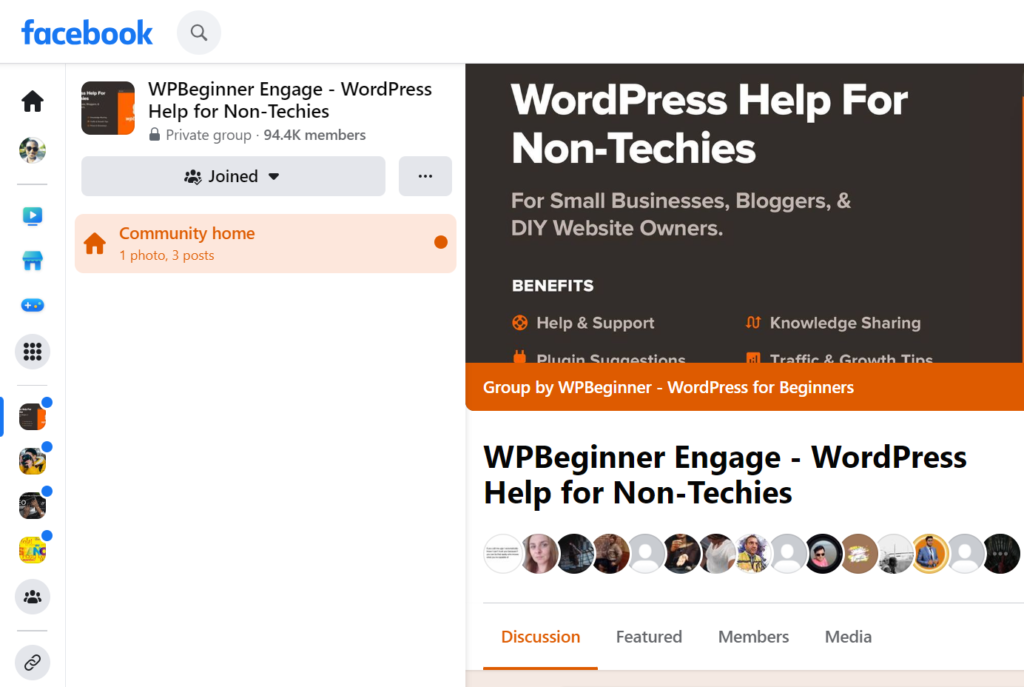
Blog guide sites: There are also websites that were designed purposefully to provide guidance with blogging. A helpful resource for WordPress newbies is the WPbeginner website. The WPbeginner website is one of the top resources for blog tutorials if you use WordPress. I wish I had spent more time on the WPbeginner website. Blogs such as Blogging From Paradise and ProBlogger provide practical blogging ideas and insights to help you keep your blog functioning and productive.
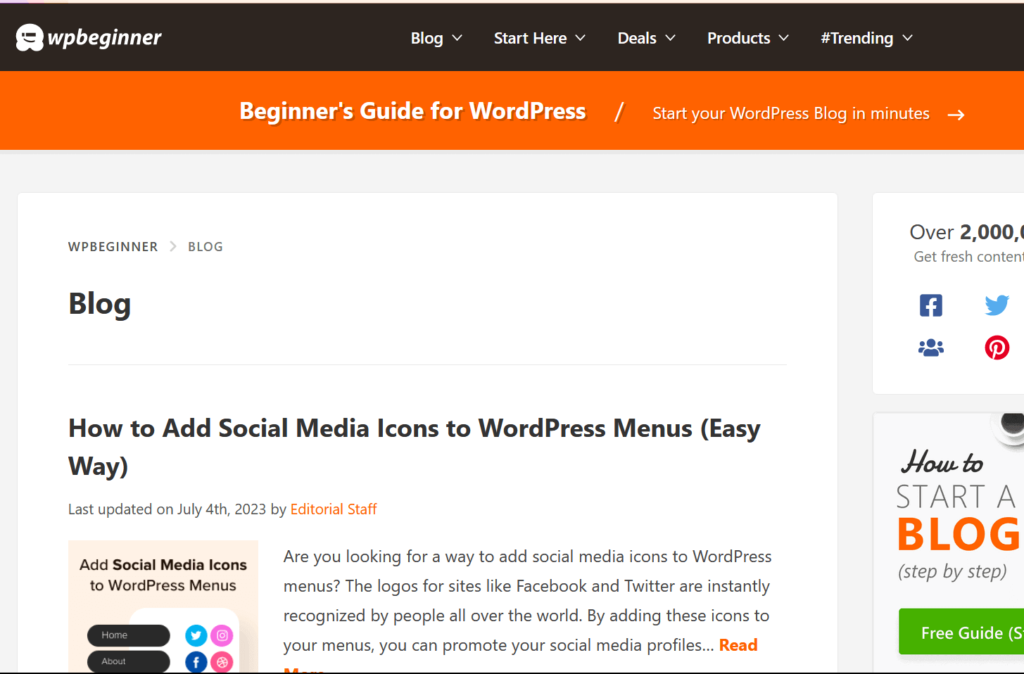
Course plugs: Course plugs are courses that equip you with the skills and knowledge that are useful for blogging. They are not necessarily blogging courses. These courses provide knowledge that can be generally applied to any other line of business. Content marketing, digital marketing, user design experience, book publishing, copywriting, and copyrighting are some examples of such courses. Coursera is an excellent place to get free course plugs. I’ve benefited from such courses, particularly Copyblogger’s Content Marketing course. That course ought to be a paid one, to be honest. The degree of detail is remarkable. Every blogger should take advantage of that free course.
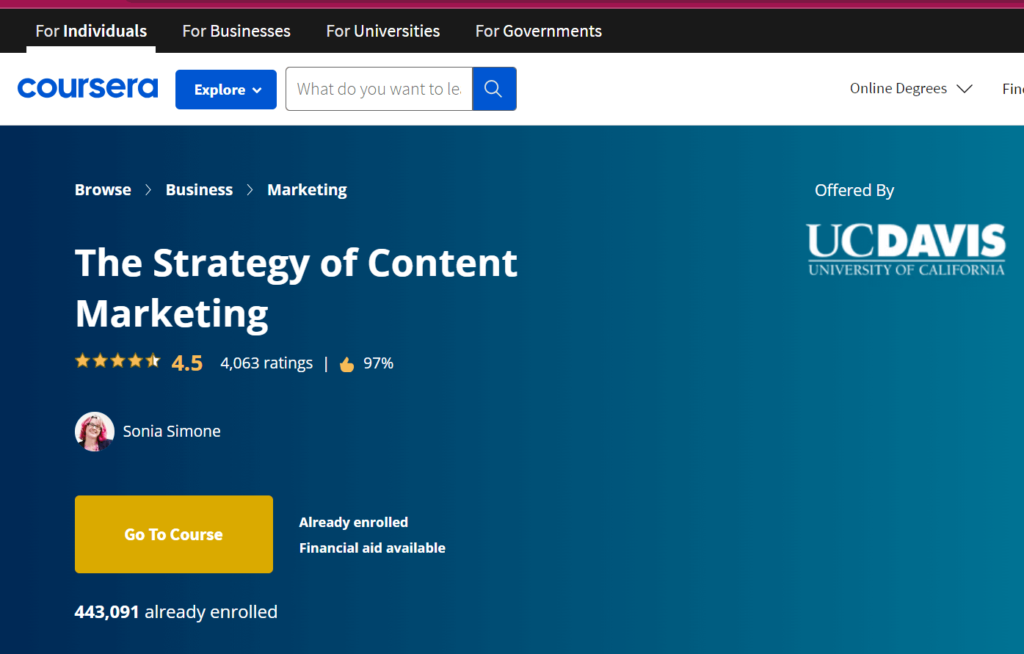
8. Focusing on SEO and ignoring Content Marketing
It was during my Content Marketing course lectures that I recognised I’d been making this error since the beginning of Peter’s Box. In the blogging world, Search Engine Optimisation is a revered term. It’s almost the first thing you’ll come across while looking for blog improvement recommendations. Some newcomers get caught up in the frenzy and hire ‘so-called’ SEO specialists to improve their blogs. Don’t get me wrong; some people have spent years honing their SEO talents. That is admirable. However, SEO is not everything. Keep in mind that SEO is a skill that must be constantly honed. This isn’t a one-day event. It is simply a small piece of the puzzle.
The major goal of optimising is to benefit search engines. That’s all there is to it. SEO is just an incentive for search engines to rank you. What about the gift for your readers? This is where many bloggers fail in content marketing. Content marketing is the promotion of your content to current and prospective readers. What’s more, guess what? SEO is merely one facet of content marketing. Copywriting, email marketing, social media marketing, SEO, user interface optimisation, and everything else that makes your material stand out from the crowd are all part of content marketing. Don’t only focus on SEO; otherwise, you’ll be the favourite of search engines but not the favourite of readers.

9. Blogging hard and not smart
You devote countless hours and restless nights to your blog. Tweaking this. Tweaking that. You expect to see some results, but you have no clue how to assess them. You’ve heard of keyword research, so you try to come up with some keywords to include in your post. You have no idea if you’re making any headway. There are web tools and plugins that will do all the hard work for you. This includes the formatting of your posts. Your ability to use these web tools effectively will cut down on the donkey work you do. It helps you save time and energy. Furthermore, the time saved may be used to focus on writing additional content. Here are a few online tools and plugins to help you blog smarter.
Semrush: For all keyword research and backlink reports.
Quillbot: A grammar checker tool to format your content. Grammarly is another alternative.
Isitwp: A tool that tests your website’s speed and diagnoses any bottlenecks that need improvement.
All In One SEO: A powerful tool for SEO optimisation (a plugin for WordPress users).
Monster Insights: This is a plugin that provides Google Analytics for WordPress. Google SiteKit is another full package you can use in place of Monster Insights.
ithemes Security: It provides strong web security for your host account.
WP Forms: Visitors reach you faster when your blog offers a contact form. Display contact forms on your ‘Contact Me’ page.
Push Engage: Push notifications are website alerts that appear on your phone or device even when you are not connected to the internet. You may have seen this from services such as Google, Uber, and others. It’s an excellent method to connect with your readers. When a visitor to your site enables push notifications, any updates you mark for push notifications will appear on the visitor’s device. If you haven’t yet subscribed to Peter’s Box, please do so immediately so you don’t miss out on all the latest and refreshing posts in store for you. If you’re using a phone or tablet, locate the enable command at the bottom of the screen. If you’re reading this on a computer, click the bell icon in the lower-right corner of the screen.
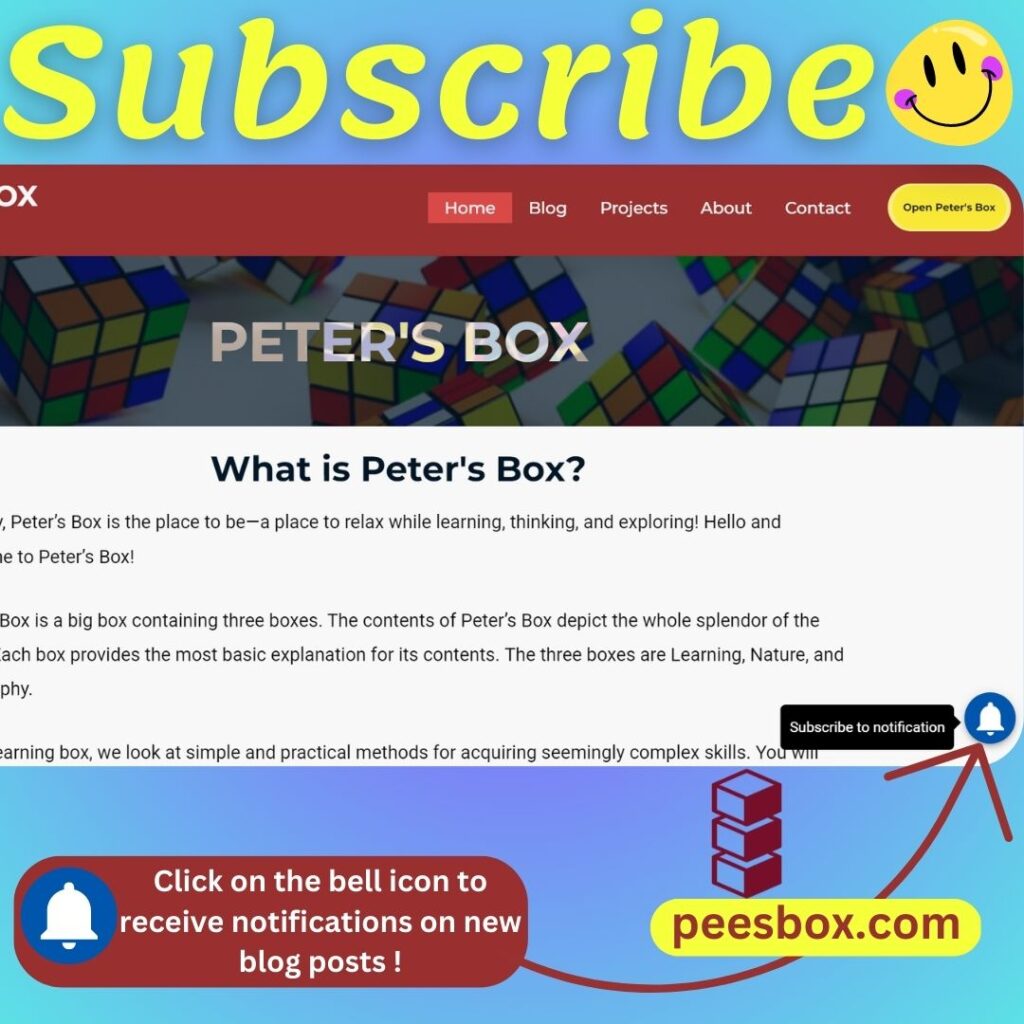
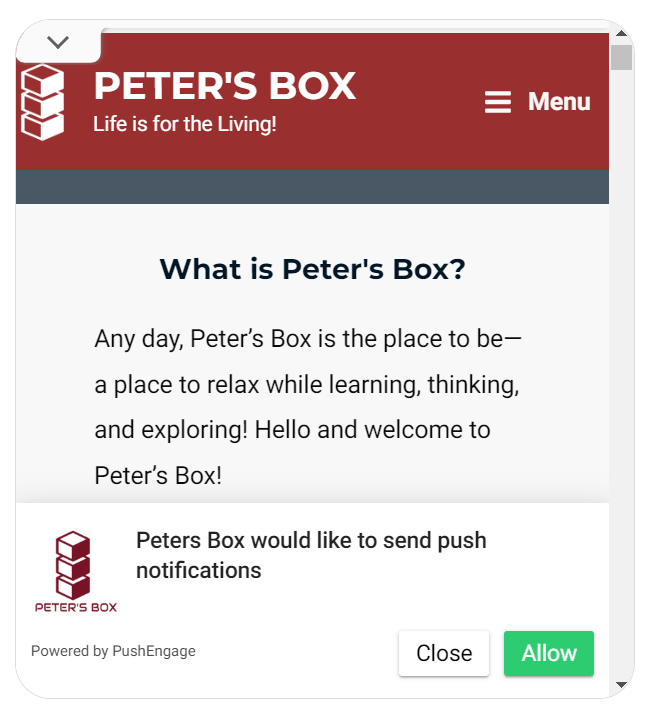
10. Self-promotion without Call To Action
Avoid blogging without a call to action. The purpose of a call to action is to encourage your readers to respond to the information you present in a post. Always encourage your readers to take action. Do you want them to spread the word about your post? Comment? Attend an event? Purchase an item? Don’t forget to say anything you want your readers to take away from the post. Don’t make it difficult for your readers to figure out what they have to do with the content on your blog.

Providing value to your readers will also eliminate the need for self-promotion. Your readers will spread the word about you! This should be the ultimate goal. Do you remember the restaurant you suggested to a friend? Did the restaurant’s owner make you advertise for the restaurant? Or that book your friend recommended you read—does he get a commission from the author? I suppose not. We naturally desire to associate with things that are valuable. Value sells on its own. However, if you must market your blog in order to generate traction, always do so with a call to action.
Go and sin no more!
Brand your blog with a defined niche. You will have no trouble attracting readers. Loyal readers will always want more, so don’t blog just because you feel like it. Create and stick to a blogging schedule! Don’t let learning about blogging stop with what you’ve learned here. Put them to use. How many grammatical mistakes did you detect in this post? Imagine having to mentally edit each sentence you read before it makes sense. How would you feel? Make it a practise to read your own content both before and after you publish it. Develop new relationships with professional bloggers to expand your domain. The blogging community is one of the most important online communities. As you provide value to others in your niche, you will reap the rewards. Don’t be the salesperson who is just interested in the customer’s money. Remember that, in addition to optimising your articles for search engines, you should also optimise your content for your readers. Content is king. Be smart about how you blog. Use the tools at your disposal to lighten the workload. Finally, tell your readers what you expect of them!

Avoid the 10 killer blogging mistakes
It is OK to make mistakes. Repeating mistakes, on the other hand, is strictly forbidden if you are a fan of Peter’s Box. Visit the WPbeginner website for all the technical instructions on how to integrate any plugin or online tool into your blog. I strongly recommend that you take the Content Marketing course on Coursera right now to develop your content marketing skills as a blogger! If you have any specific concerns with your blog, please post a comment, and I will respond with some helpful feedback. I wish you the best in your blogging journey. If you’ve been considering launching a blog recently, stop hesitating and start building the amazing blog the world is waiting for. Remember that Peter’s Box is all about living life. Peter’s Box is about maximising potential and happiness whenever, wherever, and in whatever, no matter its complexity.
Happy one-anniversary to Peter’s Box!
Peter’s Box! Life is for the Living!
What’s next in Peter’s Box? ¡Hasta luego amigos!


